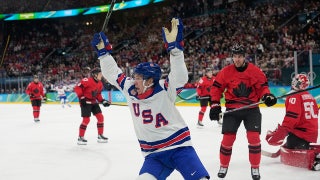AUGUSTA, Ga. – Winning a Masters green jacket doesn't always lead to champagne dreams and caviar wishes. Sometimes, as defending champion Danny Willett found out, it means outsized demands on your time and plenty of unwanted pressure.
The Englishman's brilliant final round at Augusta National — a bogey-free 67, including a 3-under on the closing stretch of six holes — already seems so last year. He missed the cut at The Players Championship, his first event after the Masters, and hasn't won since. His best finish since the calendar turned over was a tie for fifth at the Maybank Classic, an Asian-European Tour event with a weaker field than any tournament played on this side of the Atlantic this year.
Willett was a newly minted dad and moved up to No. 9 in the world soon after 2015 champion Jordan Spieth draped the green jacket over his shoulders. He's slid to 17th since.
Small wonder he arrived at Augusta National sounding less than thrilled about defending the title.
"You've achieved the greatest height in your game. You have got to the pinnacle. You've climbed Everest and you've put your flag in," Willett said.
"Unfortunately," he added a moment later, "you've got to either climb down or stay up there, and it's incredibly difficult to stay up there all the time."
In some ways, his success feels more like a curse. Having raised his game on golf's biggest stage at the biggest moment, he's increasingly frustrated when he can't do the same when there's a lot less on the line.
"The thing that obviously you kind of begin to realize is compared to that week, every week is going to be a failure, you know? ... You feel like you should be able to, and you've done it once, why can't you do it every time you play?" Willett said.
"That's where the game jumps up and bites you. You can't just do it week in and week out. There's a few men that have been able to do it over the years," he added, almost wistful, "but they are few and far between."
Distractions were never Willett's cup of tea, but with the demands of a growing family taking up more of his time, some of the trappings of being the Masters champion felt more like disturbances. The worse he played, the more he regretted being away from home.
For every outing that was a lark or a labor of love, like wearing the green jacket in the royals box at Wimbledon, or posing at the trophy ceremony with the young winners of the "Wee Willetts" golf foundation he established back near his hometown of Rotherham in the northwest of England, there were plenty he'd have preferred to skip.
Even last fall's Ryder Cup, the biennial event every European-based player circles on the calendar, lost some of its luster for Willett. Expected to be among his team's leaders, he had a bullseye on his back and couldn't muster a point in three matches.
The added attention took on a slightly darker cast when his brother, Pete, penned an article for the National Club Golfer magazine back home calling American fans "pudgy, basement-dwelling irritants, stuffed on cookie dough and pissy beer, pausing between mouthfuls of hotdog so they can scream 'Baba Booey' until their jelly faces turn red."
Willett apologized repeatedly: to his parents, who were at the Hazeltine National expecting a fun week of vacation; to his own captain and teammates, as well as to the entire U.S. squad and Ryder Cup fans everywhere. But as this exchange from Willett's conference call with reporters last month demonstrates, it's still a touchy subject.
"Just going back to The Ryder Cup and the article your brother wrote ...," the question began.
"I thought this was a Masters conference," Willett cut him off.
"If you allow me to finish asking the question," came the equally sharp retort. "Just what is your message to American golf fans as you go back to prepare for the Masters?"
"Well, obviously I've been in America now and played a couple of events and the American fans have been great as you'd expect," he replied curtly.
How long they'll stay that away, though, remains to be seen. It's a maxim of sport that it's harder to stay on top than it was to get there. Willett knew it was true, even before he found out firsthand.
If he has regrets about the past year, a reluctance to seek advice from former champions or friends on how to handle success would top the list.
"In hindsight, might have been worth it. I was busy with family life," Willett said, "and I didn't quite realize, in fairness, how hectic and how chaotic it was going to be."
___
Jim Litke is a national sports columnist for The Associated Press. Write to him at jlitke@ap.org and https://Twitter.com/JimLitke








































